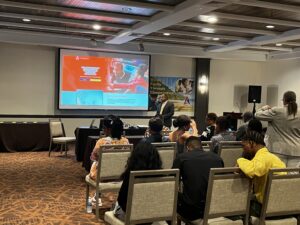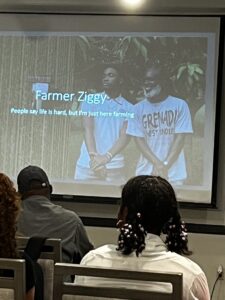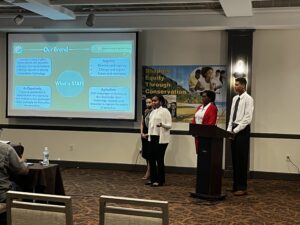Final report for EDS22-33
Project Information
CFEG Project offers virtual and in person learning to students over a two year period in order to provide the young people of the Virgin Islands an opportunity to learn about farming but also build a sustainable agriculture business. By offering teaching, training, internships, shadowing of individuals in the farm industry, and hands-on farming experiences in farming CFEG project intends to teach, train, and guide students through all of the following farming processes and topics:
-
- Effect of synthetics (all natural products used)
- genetic engineering
- Mulching
- Cover crops
- Irrigation plans
- Pasture and grazing management
- pesticides
- Technical and financial assistance
- Best Farming practices and processes
- Cross Contamination and Pollination
- Soil amendments
- Soil lighteners
- Fertilizer
- Compost
- Fish emulsion
- Tilling
- Pest Control
- Trap Cropping
- Weed Control
- Organic treatment
- Certification
- Organic Labeling
- Water Systems
- Permaculture
- Sustainable Agriculture
- Environmental stewardship (protecting the environment)
- Financial viability (protecting farmers so they can sustain farms)
- Social viability (protecting the community and the message around what is safe farming practices and how farming is important to do but also practice in a way that is safe and healthy to consumers and that sustains or grows economic development)
- Holistic
- Productive
- Profitable
- Enhance environmental resources
- Provide for the community
- Value added strategies
- Access to healthy food
- Building resilient systems
- Cooperation and collaboration with other sustainable farmers
- Investing in the future of agriculture
- Regenerative Agriculture
-
- Reverse climate change
- Rebuilding soil and organic matter
- Using plants and animals to rebuild soil biodiversity
- Teaching how soils really function
- Losing topsoils
- No tilling
- No synthetics
- Residue awareness
- Bio-diversity plant and animal diversity
- Confining animals v.s. grazing
-
CFEG will be working with other partners and actual farms in the Virgin Islands to show students how the industry works from industry experts, and how they can get involved in farming not only as a career but also as curators and cultivators of their own farming business. CFEG mission is to create a means for students to be able to grow into the future, teach their peers, and to influence the community in sustainable processes which will benefit the community and their future by allowing them to be the leaders who developed programs for protecting the environment and feeding the Virgin Islands as well as the Caribbean locally and organically. CFEG will also focus on the medical benefits that growing and sustainable agriculture can add to the students lives and the lives of their families. CFEG will document the students journey and work with students to share that journey for outreach to other students and the community about the importance of sustainable agriculture for the entire community. Examples of previous summer programs produced by CFEG and its partners are included below as examples of how CFEG runs its programs and how this project plans to expand on previously offered agriculture summer programs.
https://www.facebook.com/CenterforEducationalGrowth/videos/186674616396750/
https://www.dropbox.com/sh/7wwrrme4yb2dcrc/AAAhTQWdjVNG9JUVZjgfUjM7a?dl=0
- establish a permanent marketing campaign for permaculture, sustainable and regenerative agriculture that targets young people and future generations of the Virgin Islands to become leaders and a part of their own agriculture systems
- document and share the current and any existing permaculture, sustainable and regenerative agriculture systems in the Virgin Islands and CFEG's students participation in these systems and contributions to these systems
- begin 5 new youth, minority, farm businesses or organizations that will be the property of young people and future generations of the Virgin Islands to become leaders and a part of their own agriculture systems
- develop and share a working/mentoring network where resources are used and given to new farmers so continuous programs can be established to provide for sustainable agriculture
- run a 2 year SARE funded agriculture program as a pilot and keep stats, analysis, and detail all processes done to prepare, implement, and complete program in a guideline to use for replicating the program and integrated the program into a permanent class and curriculum structure
- develop annual curriculums that mirror the pilot program to be integrated into the school system and taught each semester starting with High School grades 9th-12th
- expand the curriculum and adapt it to be taught in the middle school system to younger students
- further expand the curriculum and adapt it to be taught in the lower school system to younger students
- establish a permanent mentorship/apprenticeship program with young adult students and current farmers in at least 3 farms on each island
- establish a competition with reward and investment which allows student to compete to establish agriculture technology and funds their idea and business so that new agriculture technology and programs are developed specifically by young people
Cooperators
- - Technical Advisor - Producer
- - Producer
- - Technical Advisor
Education
CFEG-SARES Sustainable Agriculture Youth Project Video Part I (Curriculum Development & Classroom Instruction: 1878 LLC Farm instructor)
May-December 2022
Objective: Development & Instructions of sustainable agriculture curriculum that incorporates hands-on instructions. Topics:
A. INTRODUCTION TO SUSTAINABILITY
B. WHAT MAKES AGRICULTURE “SUSTAINABLE” & SUSTAINABILITY IN ACTION (CASE STUDIES)
C. THE BIG PICTURE, SYSTEMS & REFLECTING AND CREATING
Part of the instructions were students getting firsthand experience of topics that were discussed at school. The students leave school to visit the 1878 Farms. They were excited as this would be their first time being on a farm. They were not afraid to get involved with helping the farmer plant fruit trees. They are being instructed on how to dig sustainable holes to plant soursop and guava trees. They would later return to see how to setup irrigation systems with timers for the fruit trees.
Link for 2nd Video Below
CFEG-SARES Sustainable Agriculture Youth Project Video Part II (link above) (Agricultural Field Trip & Cooperators Farm networking)
January-August 2023
Students are visiting the University of the Virgin Islands (UVI) agriculture and research extension services. They are learning about:
a) ISSUES IN SUSTAINABLE FIELD PRODUCTIONS & ORGANIC FARMING IN THE VI
b) ABOUT FIELD CROPS IN THE FOOD SYSTEM & FIELD CROPS IN THE AGRO-ECOSYSTEM
c) ANIMALS IN OUR FOOD & SUSTAINABLE HORTICULTURE IN THE VI
Students experiencing hands-on learning about bugs and pest control in agriculture, lab research about plants and seedling at UVI research services. With Animal science & Agronomy in mind, a visit with our coop the ARTS Farm was next. This allowed students who had never held a chicken to actually get to experience holding one. Finally, students visit the Nelthrope Farm on the east side of the island. They get to observe how the cattle is fed and washed then get a hayride on the back of a truck to feed cattle out on the open farm. These field trips are meant to implant memorable experiences with a hope of changing young participants mindsets about farming and its future in the Virgin Islands.
Link for 3rd Video Below
CFEG-SARES Sustainable Agriculture Youth Project Video Part III (link above) (Internship at Budhoe Farm & Business Implementation)
August 2023-March 2024
Participants interning at Budhoe Farms, Sejah, Fresh Pac & 1878 LLC Farms. Students planting seedlings for peppers and collecting soil for herb garden at work site. Participants share a working relationship with farmers and their workers. They also created a network with farmers that they can use as resources in the future. These farming bonds will assist the sustainability of the program and support the school endeavor to promote sustainable agriculture in the Virgin Islands. Finally, participants engage in proudly showing off their school garden with cilantro, parsley and peppers growing. They also each present a plan on how they will market and develop their agriculture business. As a group, the students plan to package and sell their peppers and seasoning products in the nearby vegetable market.
Objective: To establish a competition with reward and investment which allows student to compete to establish agriculture technology and funds their idea and business so that new agriculture technology and programs are developed specifically by young people.
To establish a permanent mentorship/apprenticeship program with young adult students and current farmers in at least 3 farms on the island.
Educational & Outreach Activities
Participation summary:



This Amps Institute Entrepreneur program was sponsored by the US Department of Agriculture (USDA). The program focused motivating youth to unlock their leadership potential through a series of skill-based workshops. The purpose was to provide basic knowledge for youths to successfully compete in a free-market system through innovative leadership techniques and entrepreneurial experiences. Students were tasked with presenting a sustainable agricultural plan for the Virgin Islands.
Learning Outcomes
Diverse Careers in farming
The environment plays a huge part in farming. Some plants grow best in a cooler environment, so growing plants like this might be best in a greenhouse.
Farmers in the Virgin Islands must make plans on how to protect their plants through the summer drought and hurricane season in September to November. Since there is a water shortage in the islands, we must store enough rainwater to sustain all our plants through the summer. The 1000 gallon tanks would help us maintain the plants we grew through the upcoming summer.
Technology and more research can help farmers in the Virgin Islands.
However, most Virgin Islands farmers don't have time to teach younger people, and they are resistant to change.The farmer must have a plan before he starts farming just like any other business. Additionally, the plan has to have sustainability for unpredictable environmental conditions.
Project Outcomes
The sustainable youth agriculture project peeked students’ interest in agriculture careers and research projects. The field trips with the hands-on experiences, helped cultivate a passion for agriculture among the young students. Their visits to the farms built on their social skills. They were able to interact and gain networks with the farmers. Ultimately, this exposure would lead to increased enrollment in agricultural programs at the local university. Optimistically leading to the development of future sustainable farming practices in the Virgin Islands community. One participant, Isaiah Todman, applied to the University of the Virgin Islands to major in its’ Agronomy associate degree program.
The informative learning workshops raised awareness about sustainable farming practices and stimulated participants desire to adopt eco-friendly planting methods in their backyards. Some of the topics covered like soil conservation, water management and biodiversity preservation were enlightening to the participants.
The project’s culmination of business planning provided participants with a vision for exploring a sustainable agricultural product with economic advantages. This aspect of the program focused on how students could contribute and be a part of the future growth and development of local farming communities. Discussions with participants centered around the positive impact of youth involvement in agriculture and job creation in the Virgin Islands. Additionally, job creation, income generation and the overall economic stability of the farming sector in the Virgin Islands.
Overall, the students who participated in this program walked away with a greater understanding of: 1. The diverse Careers in agriculture, 2. An appreciation of farmers and their contribution to the food production 3. A Perspective on the Business of farming and economic advantages 4. On-the job farm experience and a network of farmers who they can rely on for guidance. 5. Knowledge of starting and owning a farm business.